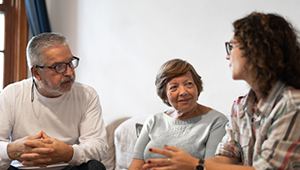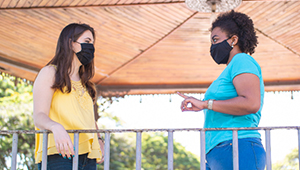Bringing community to the table
KPWHRI research partner Neely Williams shares her views on hesitancy in health research in the Black community
Hesitancy to participate in health research among Black communities and other communities of color is significant. While the memory of Tuskegee is still present, advocates highlight contemporary failures of the health care system for causing more distrust than events of the past. Studies suggest that while Black people are twice as wary of participating in research compared with white people, they are equally willing to participate when asked. In this video, KPWHRI research partner Neely Williams discusses the need for health institutions to reach out to Black communities, listen, share oversight mechanisms, and value community members’ opinions.
Read the transcript
Voiceover: At KPWHRI, we collaborate with health care providers, local communities, and scientists nationwide, addressing some of health care’s toughest questions. Recently we had a chance to speak with Neely Williams, who collaborated with us on the PCORnet Bariatric Study. She shares her views on hesitancy and health research within the Black community.
Neely Williams: We take for granted that most people know their history but it’s only when you walk out into the community and you listen to people talk about research, you will see where the hesitancy is. It often lies in just being misunderstood, but nevertheless they have some pivotal things that have happened in the history of research such as the Tuskegee study that has scarred the psyche — and it has been passed on generation to generation.
One of the things that happens in the community when you start talking about research is often, you’ll hear someone say, “I don’t want to be a guinea pig. Why should I want to be a guinea pig?” But that is often a wonderful door to open the conversation — not to dismiss the history but acknowledge the history along with the experience that the individual has had.
If allowed, share with them some of the newer and more positive things that have happened and what things have been put in place such as IRB boards and other oversight mechanisms to make sure that Tuskegee doesn’t happen again.
We just really have to be honest, there’s no way that we can erase what has happened in the past but there is a way that we can trudge towards the future and make this journey together.
When people understand that their participation is meaningful, has value, and that’s the opportunity we have when we bring community to the room is to make sure that they don’t feel left out, that their opinion is valued, and that they have a reason to be there, that they are not just there so that someone can check a list and say, “Well, we had stakeholders involved, we gave them a nice lunch and they went about their business, and now we’ll go back into our different universities and institutions and do our business as usual.” But actually, have value to what the community has brought to the table.
Research

3 concrete steps to lessen disparities in health care
Latinos are underrepresented in U.S. research studies. Magaly Ramirez, PhD, explains how to achieve greater diversity.
Healthy Findings Blog

Vaccine hesitancy in the time of COVID-19
Can lessons from Immunity Community help build acceptance of COVID-19 vaccines? Clarissa Hsu, PhD, thinks so.


